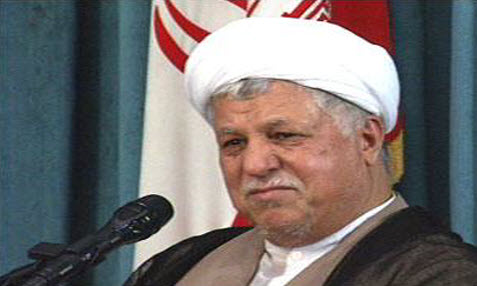
September 06-13
An Iranian news agency Sunday quoted former President Rafsanjani as saying Syria’s government had attacked its own people with chemical weapons—but it soon replaced that story with one that deleted that criticism.
Now a video has appeared that shows Rafsanjani clearly blaming the Syrian government for gassing its own people. The video also shows Rafsanjani saying that sanctions are devastating for Iran’s economy, contrary to the official government position.
The charge that Syria was behind the August 21 chemical attack is denounced by the Islamic Republic as an American falsehood intended to justify a US military attack on Syria.
Tehran has been pulling out all the stops the last two weeks to defend the Syrian government and to blame the chemical attack on Syrian rebels. A huge volume of the news stories carried by Iranian news agencies deal with the chemical warfare charge and the prospective retaliatory raid by the US military.
Government officials are lining up at the microphones to denounce the United States and accuse it of pushing the chemical attack story in order to try to justify an American attack on Syria.
The story quoting Raf-sanjani as saying the opposite was contained in a news report run by the Iranian Labor News Agency (ILNA).
In the first version of the story, Rafsanjani was quoted as saying: “The [Syrian] people have been the target of a chemical attack by their own government and now they must also wait for an attack by foreigners.”
In the revised news story, the Rafsanjani quote became: “On the one hand, the people of Syria are the target of a chemical attack, and now they must wait for an attack by foreigners.”
But Bolaghnews.com subsequently posted a video showing Rafsanjani speaking in Mazandaran province. He clearly says: “The [Syrian] people have been the target of a chemical attack by their own government and now they must also wait for an attack by foreigners.”
Before the video was posted, the new spokeswoman for the Foreign Ministry, Marzieh Afkham, flatly denied Rafsanjani had said anything about Syria using chemical weapons. “The statements of [Rafsanjani] were distorted and have been denied by his office,” she said. The Iran Times has not seen any denial from Rafsanjani himself. His website is silent.
However, the Fars news agency carried a story Tuesday asserting that Rafsanjani had actually held the United States and “its hirelings … responsible for the chemical attacks in the Muslim country.”
Fars said Rafsanjani told a meeting of the Expediency Council last Saturday, “The US had prepared everything beforehand and they themselves have stated that they had known the chemicals were due to be used three days before the attack took place.” No US official has said anything even approaching that.
In other remarks that were unchanged by ILNA, Rafsanjani went on to say: “Right now America and the Western world along with some of the Arab countries are nearly issuing a clarion call for war in Syria. May God have mercy on the people of Syria.
“The people of Syria have seen much damage in these two years. The prisons are overflowing and they’ve converted stadiums into prisons, more than 100,000 people have been killed and millions displaced,” he said.
The video shows that Rafsanjani went on to discuss sanctions and to assert—contrary to the official Iranian position—that they are having a devastating impact on Iran.
“The current difficulties we face are real difficulties,” he said. “We are under sanctions and besieged. We cannot use our natural resources. We cannot sell our oil. Even when we sell oil, we cannot repatriate the money. When we buy goods, we have to pay extra and than also must pay more for transportation. And there are many more problems.”
The official regime position is that sanctions have caused some modest disruptions, but that Iran has swiftly adjusted to them and actually benefited because sanctions have forced the country to become self-reliant and independent of other countries.